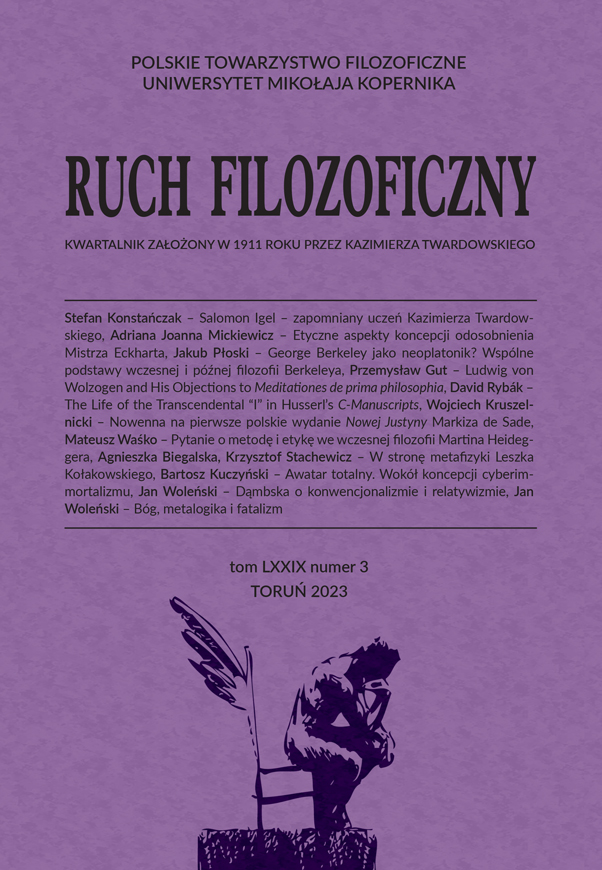he Question about Method and Ethics in Martin Heidegger’s The Question about Method and Ethics in Martin Heidegger’s Early Philosophy Early Philosophy
DOI:
https://doi.org/10.12775/RF.2023.025Keywords
Heidegger, method, phenomenology, historical method, ethics, freedom, responsibilityAbstract
The aim of this article is to analyse the relationship between the phenomena of methodicalness and ethicality in Martin Heidegger's early philosophy. Neither the method is conceived here as a research procedure, nor ethics as a particular philosophical discipline with the own field of research objects. They are two spheres of Being that imply each other. At first, the phenomenology is analysed as a way of question about Being, and then the methodical meaning of the proceeding Heidegger calls the formal indication is elicited. In result, methodicalness reveals itself as the way that leads to Being understood as the source of meaning, the way that Being as such provides. In the next step, the phenomenon of philosophizing is analysed, which Heidegger construes as a clear transcending. Eventually, this transcending turns out to be freedom, the essence of which is the phenomenon of letting-be, which lays the foundation of responsibility. Responsibility is a response to the call of Being and takes the form of Dasein commitment to the entity that Dasein has let be. Ethicality is revealed as demanding of such a response to the Being call that will bear the burden of its message. Here, the meeting of ethicality and methodicalness comes to light – the latter is the path leading to the openness of Being that this Being provides so that the requirement of ethicality will be met. That means that ethicality requires methodicalness, and methodicalness (and therefore philosophizing too) brings with itself ethical consequences for the understanding of Being and entities.
Key words: Heidegger, phenomenology, method, ethics, freedom, responsibility
References
Campbell Scott M. 2012. The Early Heidegger’s Philosophy of Life. New York: Fordham University Press.
Crowell Steven G. 2001. „Question, Reflection, and Philosophical Method in Heidegger’s Early Freiburg Lectures”. W: Steven G. Crowell, Husserl, Heidegger, and the Space of Meaning. 129–151. Evanston: Northwestern University Press.
Dahlstrom Daniel O. 2001. Heidegger’s Concept of Truth. Cambridge: Cambridge University Press.
Dahlstrom Daniel O. 1994. „Heidegger’s Method: Philosophical Concepts as Formal Indications”. The Review of Metaphysics 47, No. 4: 775–795.
Figal Günter. 2009. „Wie philosophisch zu verstehen ist. Zur Konzeption des Hermeneutischen bei Heidegger”. W: Günter Figal, Zu Heidegger. Antworten und Fragen. 163–172. Frankfurt am Main: Vittorio Klostermann GmbH.
Heidegger Martin. 1967. Sein und Zeit. Tübingen: Max Niemeyer Verlag.
Heidegger Martin. 1976. Logik. Die Frage nach der Wahrheit, (Gesamtausgabe 21). Frankfurt am Main: Vittorio Klostermann GmbH.
Heidegger Martin. 1976. „Vom Wesen des Grundes”. W: Martin Heidegger, Wegmarken (Gesamtausgabe 9). 313–364. Frankfurt am Main: Vittorio Klostermann GmbH.
Heidegger Martin. 1978. Metaphysische Anfangsgründe der Logik im Ausgang von Leibniz (Gesamtausgabe 26). Frankfurt am Main: Vittorio Klostermann GmbH.
Heidegger Martin. 1983. Die Grundbegriffe der Metaphysik: Welt – Endlichkeit – Einsamkeit (Gesamtausgabe 29/30). Frankfurt am Main: Vittorio Klostermann GmbH.
Heidegger Martin. 1993. Phänomenologie der Anschauung und des Ausdrucks (Gesamtausgabe 59). Frankfurt am Main: Vittorio Klostermann GmbH.
Heidegger Martin. 1994. Bycie i czas, przeł. Bogdan Baran. Warszawa: PWN.
Heidegger Martin. 1994. Einführung in die phänomenologische Forschung (Gesamtausgabe 17). Frankfurt am Main: Vittorio Klostermann GmbH.
Heidegger Martin. 1994. Phänomenologische Interpretationen zu Aristoteles. Einführung in die Phänomenologische Forschung (Gesamtausgabe 61). Frankfurt am Main: Vittorio Klostermann GmbH.
Heidegger Martin. 1995. „Einleitung in die Phänomenologie der Religion”. W: Martin Heidegger, Phänomenologie des religiösen Lebens (Gesamtausgabe 60). 1–156. Frankfurt am Main: Vittorio Klostermann GmbH.
Heidegger Martin. 1995. „List o humanizmie”, przeł. Józef Tischner. W: Martin Heidegger, Znaki drogi, przekład zbiorowy. 129–168. Warszawa: Fundacja Aletheia.
Heidegger Martin. 1995. „O istocie podstawy”, przeł. Justyna Nowotniak. W: Martin Heidegger, Znaki drogi, przekład zbiorowy. 25–65. Warszawa: Fundacja Aletheia.
Heidegger Martin. 1996. Einleitung in die Philosophie (Gesamtausgabe 27). Frankfurt am Main: Vittorio Klostermann GmbH.
Heidegger Martin. 2002. „Wprowadzenie w fenomenologię religii”. W: Martin Heidegger, Fenomenologia życia religijnego, przeł. Grzegorz Sowinski. 5–149. Kraków: Znak.
Heidegger Martin. 2009. Podstawowe problemy fenomenologii, przeł. Bogdan Baran. Warszawa: Fundacja Aletheia.
Michalski Krzysztof. 1978. Heidegger i filozofia współczesna. Warszawa: PIW.
Oudemans Theodorus C.W. 1990. „Heideggers «logische Untersuchungen»”, Heidegger Studies 6: 85–105.
Pöggeler Otto. 1980. „Heideggers Neubestimmung des Phänomenbegriffs”. Phänomenologische Forschungen 9: 124–162.
Rosales Alberto. 1970. Transzendenz und Differenz. Den Haag: Martinus Nijhoff.
Stachewicz Krzysztof. 2004. „Martina Heideggera myślenie gruntu etyki”, Etyka 27: 127–138.
Strzelecki Radosław. 2006. Odpowiedzieć Byciu. Odpowiedzieć Innemu. Kraków: WUJ.
Tugendhat Ernst. 1970. Der Wahrheitbegriff bei Husserl und Heidegger. Berlin: Walter de Gruyter & Co.
Waśko Mateusz. 2021. „Fenomen rzucenia we wczesnej filozofii Martina Heideggera”. Argument: Biannual Philosophical Journal 11: 259–276.
Weischedel Wilhelm. 2004. „Istota odpowiedzialności”, przeł. Jacek Filek. W: Filozofia odpowiedzialności XX wieku. Teksty źródłowe, red. Jacek Filek. 79–111. Kraków: WUJ.
Downloads
Published
How to Cite
Issue
Section
License
Copyright (c) 2024 Mateusz Waśko

This work is licensed under a Creative Commons Attribution-NoDerivatives 4.0 International License.
Stats
Number of views and downloads: 210
Number of citations: 0



